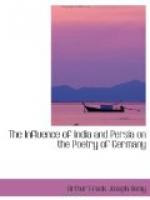[109] In tausend Formen, p. 169; Sie haben wegen der Trunkenheit, p. 178.
[110] Noten u. Abhandlungen, p. 260.
[111] Ibid. p. 264.
[112] That Goethe knew of the mystic interpretation to which Hafid is subjected by Oriental commentators is evident from “Offenbar Geheimnis,” p. 38, and from the next poem “Wink,” p. 39.
[113] See Paul Horn, Was verdanken wir Persien?, in Nord u. Sued, Sept. 1900, p. 389.
[114] Rueckert’s Werke, vol. v. 286.
[115] Platen, Werke, i. p. 255.
CHAPTER V.
SCHILLER.
Schiller’s Interest in Sakuntala—Turandot.
While the Orient, as we have seen, cast its spell over Germany’s greatest poet and inspired the lyric genius of his later years for one of its most remarkable efforts, it remained practically without any influence on his illustrious friend and brother-poet Schiller. If Schiller had lived longer, it is not impossible that he too might have contributed to the West-Eastern literature. As it is, however, he died before the Oriental movement in Germany had really begun. At no time did he feel any particular interest in the East. Once, indeed, he mentions Sakuntala. Goethe had drawn his attention to a German version of the Gitagovinda and this reminded Schiller of the famous Hindu drama which he read with the idea of possibly utilizing it for the theatre.[116] This idea he abandons owing to the delicacy of the piece and its lack of movement.
An attempt has been made to prove that to Kalidasa’s drama Schiller was indebted for the motive of his “Alpenjaeger,” but it cannot be said to have been successful.[117]
* * * * *
Though there was no direct Oriental influence on Schiller’s poetry, there is one dramatic poem of his which indirectly goes back to a Persian source. It is Turandot. The direct source for this composition was Gozzi’s play of the same name in the translation of August Clemens Werthes, which Schiller, however, used with such freedom that his own play may be regarded as an original production rather than a version. The Italian poet based his fiaba on the story of Prince Kalaf in the Persian tales of Petis de La Croix.[118] Now, as has been pointed out by scholars,[119] the name of the heroine, who gives the name to the play, is genuinely Persian, Turan-ducht, “the daughter of Turan,"[120] and although the scene is laid in China, most of the proper names, both in Gozzi and Schiller, are not at all Chinese, but Persian or Arabic. The oldest known model for the story is the fourth romance of Nidami’s Haft Paikar, the story of Bahramgur and the Russian princess, written 1197.[121] Whether Schiller was aware of the ultimate origin of the legend or not, he certainly made no attempt to give Persian local color to his piece, but on the contrary he studiously tried to impart to




